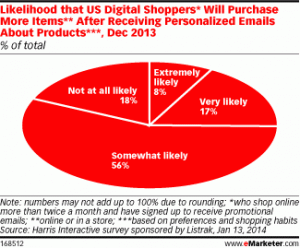
A survey conducted in December of last year found that the vast majority of email recipients were more likely to increase their purchases from a retailer if the email message was highly personalized based on the recipients previous shopping behaviors and preferences. The data raises an interesting question - could these highly personalized messages, which consumers are receptive to, also be used to secure express written consent, per the new Telephone Consumer Protection Act (TCPA) rules, to permit a telephone call from the retailer as well?
Let's look at the study data first.
Harris Interactive found that 81 percent of respondents to their survey said they were at least somewhat likely to make additional purchases, either online or in-store, as a result of highly targeted emails.
Further, 82 percent of those surveyed said they were somewhat willing to accept an increase in messaging; only 18 percent said they had no interest.
Some 69 percent of consumers polled agreed at some level that they were willing to share more information about their shopping preferences with retailers, in order to receive more highly personalized, more relevant, messages.
So, we have consumers who have opted into receiving emails in the first place, and are highly receptive of those emails, particularly if they can be made increasingly relevant.
How can the contact center turn this into consent to receive a telephone call too?
A Wilson Sonsini Goodrich & Rosati analysis of the changes to the Telephone Consumer Protection Act in October of last year notes that individuals signed prior express consent can take the form of an electronic or digital signature, such as the one that conforms to the E-SIGN Act.
So it would seem - and, gentle reader, this is not legal advice, you should satisfy yourself on this point with your own attorney - that it should be a simple matter to leverage those highly personalized email messages to solicit telephone opt-ins as well, confirmed with a digital signature. This telephone opt-in is also an opportunity to confirm the correct phone number by which the recipient wants to receive calls.
Naturally, the requisite disclosure that the email recipient may also receive a phone call needs to be clear and conspicuous. But it would also behoove the retailer to make clear that the purpose of the telephone calls would be to provide timely, highly relevant, information to the recipient, just as the emails do.
Ideally, a single, multichannel customer engagement platform would manage all of this, including tracking consent forms. We can help - call us.
Want us to reach out to you to discuss this topic in more depth?
